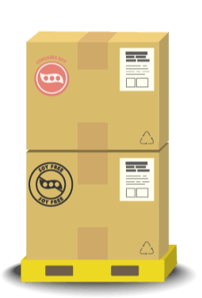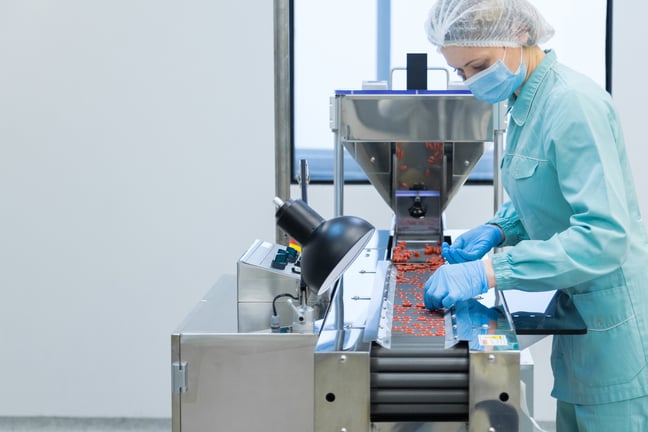Many Pharmaceutical and Nutraceutical companies are facing rapid expansion with experts predicting that the industry will continue to grow to $1.5 trillion by 2023. Consumer buying habits point to increased demand for nutritional supplements, alternative treatments (including medicinal marijuana), and generic prescriptions to prevent illness and manage symptoms. It sounds like a good problem to have, but unforeseen spikes in demand can be detrimental to companies that aren’t agile enough to keep up.
 In several recent facility tours, we have seen warning signs of organizations struggling to manage growth and profitability. Some issues that we’ve noticed, like manual pick sheets and the lack of equipment to read barcoded labels, result in waste and lost productivity. Other red flags, like unmarked boxes blocking aisles and allergen-containing ingredients stacked together, set the stage for potentially dangerous human error. Most often, these challenges originate from systems, processes and workflows that contribute to ineffective inventory management controls. The two areas we focus on for immediate improvement are inventory replenishment and manual processes.
In several recent facility tours, we have seen warning signs of organizations struggling to manage growth and profitability. Some issues that we’ve noticed, like manual pick sheets and the lack of equipment to read barcoded labels, result in waste and lost productivity. Other red flags, like unmarked boxes blocking aisles and allergen-containing ingredients stacked together, set the stage for potentially dangerous human error. Most often, these challenges originate from systems, processes and workflows that contribute to ineffective inventory management controls. The two areas we focus on for immediate improvement are inventory replenishment and manual processes.
Predicting inventory replenishment levels across diverse types of active ingredients, excipients, finished goods and packaging takes a skilled workforce combined with a finely-tuned software solution to account for all the variables. Without these in place, inventory shortfalls cause production delays which result in expedited (inbound & outbound) shipping fees, late shipments, poor customer satisfaction and ultimately lost sales. To avoid this, companies with poor inventory controls require higher levels of safety stock leading to increased carrying costs, require additional warehouse space, and underutilization of assets. A modern ERP solution can account for variables like in-transit time, subcontractor bottlenecks, customer demand, supplier lead time and more.
MRP applications without precise inventory counts only magnify the predictability challenges. MRP will attempt to smooth transactional peaks & valleys to the extent of recommending extreme levels of inventory to account for inefficiencies
 Manual processes across the organization from lab formulations to picking fulfillment create opportunities for errors, communication gaps, and information silos. Companies that automate processes like supplier invoices, warehouse automation and inventory data collection recognize real ROI through reduced costs, increased employee productivity, and the ability to grow without adding headcount. For example, warehouse automation allows companies to organize its space to minimize pick routes, automate put-away instructions to avoid cross-contamination, waste, and product recalls. Barcoded data capture validates inventory transactions that eliminates employee interpretation, inefficiencies and errors.
Manual processes across the organization from lab formulations to picking fulfillment create opportunities for errors, communication gaps, and information silos. Companies that automate processes like supplier invoices, warehouse automation and inventory data collection recognize real ROI through reduced costs, increased employee productivity, and the ability to grow without adding headcount. For example, warehouse automation allows companies to organize its space to minimize pick routes, automate put-away instructions to avoid cross-contamination, waste, and product recalls. Barcoded data capture validates inventory transactions that eliminates employee interpretation, inefficiencies and errors.
Accurate costing and the ability to estimate costs are directly impacted by inventory precision. Inventory accuracy provides confidence throughout product planning, production, and fulfillment and minimizes disruptions that absorb additional costs. When true costs are realized and profitability is maximized, decision-makers can plan with conviction, finance teams can identify profitable and non-profitable revenue sources, and customers benefit from stable prices and inventory integrity leading to repeat sales and brand loyalty.
Is your software system, lack of best practices, or a combination of both holding your organization back? As pharma companies feel the growing pains of increased demand, it becomes critical to review current software solutions and workflows, optimize the supply chain, and invest in automation that reduces manual processes. Contact RKL for an assessment of your technology, team, and business operations. Our expert consultants will identify the challenges and provide insights with measurable outcomes.
6 MUST-HAVE ERP FEATURES FOR THE PHARMACEUTICAL INDUSTRY
About RKL eSolutions and Sage X3
RKL eSolutions is an award-winning Sage Partner and professional services firm specializing in helping pharmaceutical companies from startups to global organizations accelerate innovation and digital transformation.
With solutions like Sage X3, we ensure you have an integrated, purpose-built platform to optimize your supply chain, manage costs, simplify compliance, and make strategic decisions with real-time insights.


